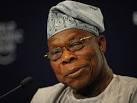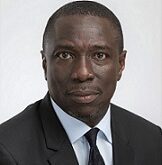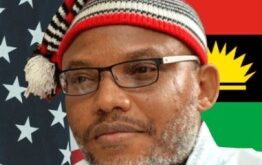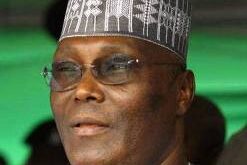By Ehichioya Ezomon
Former President Olusegun Obasanjo allegedly wrote a letter to the British government, urging it not to interfere in the February-March General Election in Nigeria.
But Obasanjo – a renowned “letter writer” on mostly Nigerian politico-socio-economic affairs, and not one to retract his statements – has denied penning the missive.
Yet, the warning was timely due to the importance of the poll, and the interest shown on its conduct and outcome by Nigerians and the global community.
Particularly concerning is the presidential election of February 25 that involves 18 political parties and 18 candidates, accordingly.
It’s the second time in Nigeria’s democratic system that a president will hand over to another after a maximum eight-year tenure of two terms of four years.
Obasanjo, who ran and won in 1999 and 2003 under the Peoples Democratic Party, handed over in 2007 to Umaru Musa Yar’Adua on the same platform of the PDP.
Yar’Adua didn’t complete his tenure, as he died in 2010, and was succeeded by his Vice President Goodluck Jonathan, who won in 2011 but failed re-election in 2015.
Opposition leader Muhammadu Buhari won the 2015 and 2019 polls, flying the flag of the All Progressives Congress.
Buhari, who completes his eight-year tenure on May 29, will hand over the baton to one of the 18 presidential contestants.
Four candidates lead the pack of 18 right from the primaries held between May and June 2022.
They’re former Vice President Atiku Abubakar of the PDP, former Lagos State Governor Bola Ahmed Tinubu of the APC, former Anambra State Governor Peter Obi of the Labour Party, and former Kano State Governor Rabiu Musa Kwankwaso of the New Nigeria Peoples Party.
It’s been a titanic battle by the quartet trying to outwit each other in the media and on the campaign trail they’ve extended overseas.
Atiku and Obi have visited the United States – and Obi has toured several European countries – to drum supports for their ambition.
Three of the candidates – Tinubu, Obi and Kwankwaso – have taken turns at Chatham House in London, to sell their action plans to Nigerians there and elsewhere.
Could the externalising their campaigns attract foreign interference that may impinge on Nigeria’s domestic affairs?
It’s a possibility, especially in the wake of Atiku’s visit to London – and on account of a statement by the Presidential Campaign Council of the PDP on January 10.
Dele Momodu, the PCC’s Director of Strategic Communications, said the UK government had invited Atiku to discuss areas of potential collaboration between Nigeria and Britain under an Atiku presidency.
Momodu’s words: “Five weeks to election and the UK government invites front leading candidate to discuss areas of future potential collaboration between both countries.
“An internal source is quoted saying an internal poll by the British government shows AA (Atiku Abubakar) as the leading candidate and the possibility of working together for a more effective Post BREXIT world which promises to be a win win for both countries.
“This is especially imperative as the UK seeks to improve and increase trade partnership with Nigeria.”
Britain hasn’t denied the statement, but Momodu’s heads up should brace Nigeria for external attempts to “steal” the February poll for a particular candidate.
Thus, the said letter by Obasanjo – a global citizen that has capacity to sniff and pick up intel about the 2023 poll – is apt to warn the British government to “back off the poll and allow Nigerians to decide the outcome,” the media report.
Obasanjo reportedly told the British authorities that it won’t be business as usual, recalling a reported 2002 plan by Britain to remove him from office via his 2003 re-election bid.
But Obasanjo has debunked the letter through his media aide, Kehinde Akinyemi, who, on January 12, stated that apart from the January 1 letter to Nigerian youths, and the other to Prof. Toyin Falola on his 70th birthday, “there has been no other public or private letter written to anybody.”
“The reading public is, for the umpteenth time, reminded that only a statement duly signed by Chief Olusegun Obasanjo or by his media assistant, Kehinde Akinyemi, are to be allowed into the media space,” Akinyemi said.
“If need be, necessary checks can be made to confirm the authenticity of such documents before publication to avoid any embarrassment.”
Akinyemi also denied Obasanjo’s alleged plan to scheme the February 25 poll for which he’s adopted Obi of the LP.
“The trending story on the alleged plan by the former President to collude with the electoral body in the Presidential election of February 25 is completely false,” Akinyemi added.
Had the said Obasanjo letter counted, it would’ve aided Buhari’s warning against foreign interference in the election, as he’s promised to bequeath a legacy of credible franchise to Nigeria.
Buhari renewed that pledge on January 12 when he received letters of Credence from ambassadors to Nigeria, and during an iftar dinner (a meal held every day during Ramadan at sunset) for envoys at the State House in Abuja.
The envoys, who presented their letters of Credence, were: Nicolas Lang, Switzerland; Annika Hahn Englund, Sweden; Peter Ryan, Ireland; Kitiisak Klomchit, Thailand; Nicolas Nyouky, Senegal and David Chaot of South Sudan.
To the ambassadors, Buhari said: “As you’re all aware, the tenure of this administration ends on 29th May, 2023. Typical of election years all over the world, the tempo of political activities is often high.
“That’s the nature of democracy. I’m committed to bequeathing a stronger culture of credible elections to Nigeria than I met.
“As Nigeria goes through this trajectory, I urge our friends in the global community, represented by you, the Diplomatic Corps, to adopt a positive role that reinforces the doctrine of respect for our internal affairs and respect for facts devoid of pre-conceived notions and bias.”
Buhari also sent a warning to domestic mischief makers, that he’d use all legal means to protect Nigerians’ votes during the poll.
Those planning to rig the elections should think twice “because I intend to resolutely protect and defend the sacred will of the Nigerian people, to be expressed through the ballot box,” Buhari said.
Not done with the envoys, Buhari tacitly steered them from poking their nose in 2023 election, to areas that would benefit Nigeria and their respective countries.
Buhari said: “As you settle down to your diplomatic responsibilities, I am hopeful that you will appreciate the political, socio-economic and cultural diversities which are the hallmarks of the Nigerian nation.
“I encourage you to build friendships and take time to fraternise across the length and breadth of the country, including interfacing with both the public and private sectors in a bid to explore areas of mutual benefit to your respective countries and Nigeria.
“Sectors such as healthcare, education, infrastructure, local manufacturing, pharmaceuticals, agribusiness, transportation, solid minerals are areas of particular interest to us and foreign investors alike.
“This will enable us to collectively strive to resuscitate all our countries’ economies in the post pandemic global recovery processes.”
The ambassadors, at the separate events – receipt of their letters of Credence and iftar dinner – wished Nigeria “peaceful, free and fair elections.” They pledged the international community’s support for Nigeria “before, during and after the elections,” and extended their goodwill to President Buhari in his remaining days in office.
It’s doubtful if these envoys can stop their home governments’ intents to interfere in the general election, as they take orders, and implement in their host countries.
* Mr Ezomon, journalist and media consultant, writes from Lagos, Nigeria
 PH Mundial – Port Harcourt Online Newspaper News Across The Region
PH Mundial – Port Harcourt Online Newspaper News Across The Region





